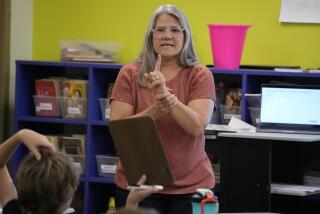Children’s brain mass counts for better math skills
- Share via
Forget your third grader’s IQ, or working memory, or even previous mathematical abilities. When it comes to improving in math, it’s the brain’s hard wiring that counts.
Researchers found that the volume of the hippocampus, a region associated with memory formation and recall of stimuli, trumped every other factor they measured when it comes to predicting how a child will respond to an eight-week program of math tutoring. Their results were published this week in the Proceedings of the National Academies of Science.
But don’t despair — all of the two dozen children improved with math tutoring. It’s just that the hippocampally endowed did better, and brain scans proved more reliable at predicting this advance than traditional behavioral measures did.
“I would say we have identified why some children improve a lot, and why some improve minimally,” said Vinod Menon, a psychiatrist at Stanford University and one of the authors of the study. “What we’ve identified is predictors of how people improve.”
In addition to the volume of the right side of the hippocampus, its connections to the areas of the prefrontal cortex and basal ganglia proved important, the researchers found. Those elements of the brain’s internal architecture are not normally associated with arithmetic learning. But they proved crucial to children who are transitioning from rudimentary counting to more complex learning strategies.
At 8 to 9 years old, children don’t have the “schematic knowledge” that adults rely on to learn, because their memory is not yet as consolidated, said Menon. Instead, they rely on rapid retrieval of information. “Where you don’t have basic knowledge,” Menon said, “you rely on this kind of associative memory.”
Researchers used functional magnetic resonance imaging, fMRI, to scan the brains of two dozen third-graders who then underwent eight weeks of tutoring focusing on number knowledge and speed drills. Their speed, accuracy and efficiency at solving problems were measured before and after the tutoring.
Conventional statistical methods showed a correlation between the volume of gray matter and learning improvements. But the researchers went further, essentially “teaching” a computer to make predictions of outcomes based on behavioral data or brain volume. Predictions based on brain volume proved most accurate, they found.
“None of the behavioral measures … including assessments of intelligence quotient, working memory or math and reading abilities were associated with arithmetic problem solving performance improvements,” the authors concluded.
So, if your child’s right mind is wrong for math tutoring, should you just give up? No, Menon said. Educators may just have to find other teaching methods.
“So far in these kind of academic learning domains we’ve had a one-model-fits-all approach,” Menon said. “What this data shows is you may have to try a different strategy.”







